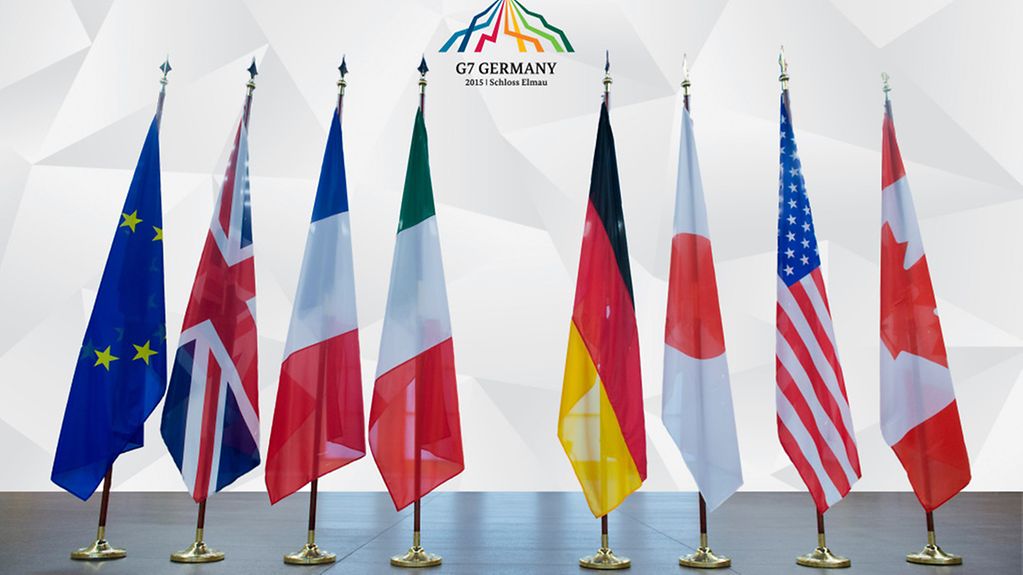German Presidency
On 7 and 8 June 2015 Germany will be hosting the G7 summit. Chancellor Angela Merkel has invited the heads of state and government of the G7 states to Schloss Elmau, south of Munich, where they will discuss the major global challenges within the framework of this informal group of leading industrial nations.
3 min reading time

The G7 summit will take place on 7 and 8 June 2015
Photo: Photothek.net
After the meeting of the G7 states in June 2014 in Brussels, Germany assumed the Presidency of the Group of Seven (G7) earlier than originally planned. Having hosted summits in 1978, 1985, 1992, 1999 and 2007, Germany will now host the next summit meeting on 7 and 8 June 2015 in Schloss Elmau.
Germany, France, the United Kingdom, Italy, Japan, the United States of America and Canada (since 1976) together make up the G7. The European Commission is also represented at all meetings.
The motto of this year’s summit is “Think Ahead. Act Together”. Key topics for the German G7 Presidency and G7 Summit in Schloss Elmau include the global economy, foreign, security and development policy, as well as empowering self-employed women and women in vocational training, energy security, and the upcoming UN conferences on international climate protection and the post-2015 agenda. These issues are all of global medium- to long-term importance. The Group of Seven are aware of their shared responsibility – and conscious that they will only be able to find answers to the questions of the future if they closely coordinate their policies.
G7 – a community of shared values
Following Russia’s violation of the sovereignty and territorial integrity of Ukraine, the G7 heads of state and government decided on 24 March 2014 in The Hague Declaration not to attend the planned G8 summit in Sochi in June 2014 under the Russian Presidency, and to suspend the G8 as a format until further notice. They noted that it was not possible to have meaningful discussion within the G8 at present.
Instead, the G7 met for the first time since 1998 without Russia at a summit on 4 and 5 June 2014 in Brussels. Since then the G7 process has been continued. This decision of the G7 underscores the fact that it is a community of shared values which will not tolerate violations of international law.
Informal group
The G7 is an important format for political and economic cooperation among the leading industrial nations. It is an informal group, with no statutes, no administrative structures of its own and no formal resolutions.
Because of the informal nature of the structure, the Presidency plays a particularly important role. The country holding the Presidency is responsible for the organisation and for the agenda for the duration of the Presidency.
The form and colours used in the logo of the G7 Summit in Schloss Elmau symbolise the nature of the meeting and the diversity of its participants. In depicting a mountain it makes reference to the conference venue’s Alpine landscape. The seven lines can be interpreted as different routes leading towards a common goal. The colours used reflect the countryside of the Wetterstein mountain range and the architecture of Schloss Elmau.
Crisis management
At its annual summit meeting the G7 nations agree on common positions regarding global political matters – in particular in the fields of the global economy, foreign and security policy, development and the climate.
The G7 states see their responsibility for tackling global crises. In recent years the agendas for summit meetings have included the Arab Spring, energy issues, health, food security and transparency in the extractive industries.
Sherpas and their duties
The topics for the summit are prepared by the Chancellor’s Sherpa and his opposite numbers in the other G7 states. The Sherpas also prepare the draft of the final statement of the G7 summit, which is then discussed and adopted by the heads of state and government.
The German Sherpa – the Chancellor’s personal representative for the G7/G8 and G20 summits – is Lars-Hendrik Röller, the Economic and Financial Policy Advisor to the Chancellor.
Within the framework of the German G7 Presidency, three ministerial meetings are planned in the run-up to the summit:
- The ministers of foreign affairs met in Lübeck on 14 and 15 April 2015.
- The ministers of energy will meet in Hamburg on 11 and 12 May 2015.
- The ministers of finance will meet in Dresden from 27 to 29 May 2015.
- A meeting of science ministers in Berlin on 8/9 October 2015.
- A meeting of health ministers in Berlin on 8/9 October 2015.
As at 29 May 2015